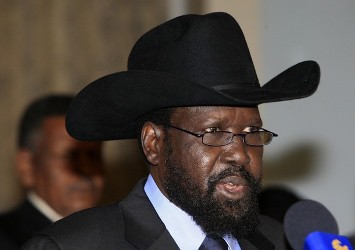S. Sudan’s Kiir urges Muslims not to politicise Islam
August 17, 2012 (JUBA) – South Sudan President, Salva Kiir this week urged Muslims all over the young country not to use Islam to advance their political agenda, but instead join members of other religious denominations in efforts to build the new nation.

“South Sudan under my leadership will not allow anyone to use Islam as a tool for advancing political agenda. There is no room for politicizing Islam or any other religion in this country,” Kiir told Muslims and other dignitaries on Thursday.
The President, also congratulated the Muslim community who turned out in hundreds at the occasion, upon what he described as a peaceful fasting during their Ramadan period.
The South Sudanes leader also instructed all state governors in the 10 states of the country to hand over all assets belonging to Muslims, that may have either been confiscated for political reason, or illegally repossessed under unclear circumstances.
A renowned Sheikh, who spoke to Sudan Tribune on condition of anonymity on Friday said several complaints have been filed by Muslims in South Sudan regarding their properties, mainly buildings allegedly confiscated by state governments.
“I believe President Salva Kiir’s message to governments across the 10 states will help us recover our properties, which were mainly taken away from us after the referendum in January last year and the moment the country got its independence,” he said.
Around 10% of South Sudan’s population is Muslim. The region seceded from Sudan on 9 July 2011 as part of a peace deal that ended decades of civil war, which was often categorised as one between Sudan’s predominantly Islamic north and Christian south.
However, many historians dispute this analysis of the war pointing to the fact that the war was more about the unequal relationship between the centre and periphery economically and the inability of regimes to recognise the ethnic diversity of what was Africa’s largest country.
As well as Islam and Christianity many South Sudanese practice traditional indigenous religions.
(ST)
